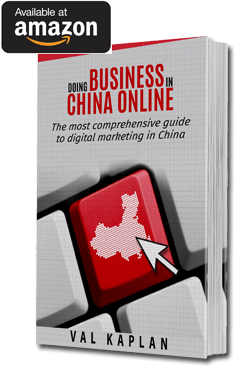This post continues on the topic of the most efficient ways to communicate with Chinese businesses. In the first part, we’ve discussed the role of trade shows, exhibitions and conferences.
In the second part we are going to look at each of the remaining communication channels:
Email communication is one of the preferred ways to communicate with your customers in China, also being the most convenient method to maintain contact with your existing clients. While many Chinese may feel embarrassed of the low level of their oral English communication abilities, they would feel quite comfortable discussing the same issues in the written communication.
In fact, most business people in China today have a very decent level of written English making it preferable to direct phone calls. Email is a great way to follow up on meetings and provide more details after initial contact. Make sure to write your emails in plain language and avoid long sentences to keep it more readable.
Websites
Having a localized website is essential for promoting your business in China, a country with the estimated 400 million email users. Localization of your website requires a well planned effort with the most important aspect of it, translation, discussed in our previous post.
92% of Chinese internet users use some sort of social media platform making it essential to maintain your presence there as well.
Having professionally designed, modern looking website may also set you apart from most Chinese based competitors that tend to have messy and cluttered sites. Remember, that your website is probably the first place an interested client will go to after meeting your for the first time.
Social Media
92% of Chinese internet users use some sort of social media platform making it essential to maintain your presence there as well. Sina Weibo, Chinese micro blogging platform and WeChat, mobile network, are by far the most popular of those services. The great thing about Weibo and WeChat is the ability to spread your message instantly and directly to your followers’ mobile devices.
Once you’ve setup your Weibo account, make sure to put its URL and QR code on your printed and digital marketing material and encourage your customers to connect (WeChat is different from Weibo in that way).
LinkedIn is currently not as popular in China as the alternative professional networks, we will review those services in subsequent posts.
Face-to-face meetings
Personal connection still rules in Chinese business environment. Taking time to personally visit your customers is one of the best investments you can make.
Insist on accompanying your sales people, your agent or distributor on their visits even if you don’t speak any Chinese. If you make a presentation, make sure that someone from your company, who knows the material, provides proper translation.
Phone calls
While phone calls can be of limited use if your clients have a difficulty understanding your English (or your accent) they still can be an efficient way to keep in touch with those who do speak it well enough. However, with the proliferation of instant messaging, where one can control his/her availability, calling someone’s cell phone directly may seem less considerate.
Great mobile instant messaging services, such as WeChat, could be a great way not only to communicate but also to spread your marketing message as well.
Post (Regular Mail)
Mailing printed material is one of the least efficient ways to communicate in modern times and China is no exception. In B2B marketing settings, mailing information by post is quickly losing its value and I’d advise to avoid it;
Relationship and Networking
Chinese guanxi remains important in Chinese business environment, although the whole concept can be alien to many foreigners. Guanxi refers to one’s network of personal relationships in a business context. The concept of guanxi also implies that business relationships can often transform into personal friendships, and indeed many Chinese business people consciously spend a great deal of time and energy nurturing such relationships. This can take the form of banqueting, evening entertainment or gift-giving – activities that can seem onerous and unnecessary to many Westerners.
As Matthew Harrison and Mark Hedley of B2B International write in their white paper: “Although such networking and relationship-building is clearly important to the sales process in China, there is a tendency among some commentators to overemphasize its importance when trying to penetrate the Chinese market.
As in any market, building strong relationships is extremely important to achieving market success, although guanxi is no substitute for a strong product offering or a trustworthy supplier. What Western companies sometimes have difficulty coming to terms with is the way in which this trust is gained, and the time it often takes to convince the customer that yours is the product or service that meets their needs. The overriding piece of advice for Western companies would be to understand the importance of establishing relationships when targeting Chinese companies, and to be prepared for the patience required for this.”




